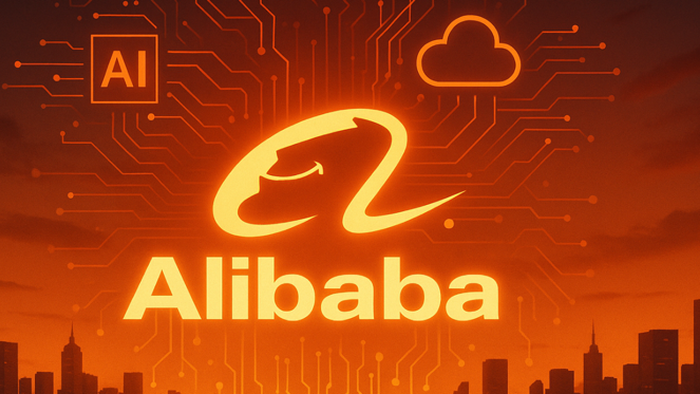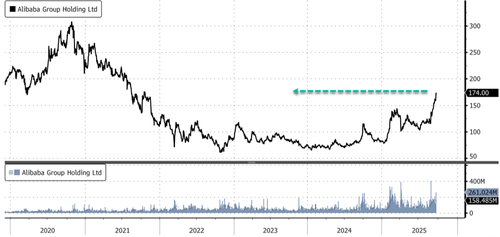


The show must go on, as they say.
After Nvidia announced a $100 billion investment in OpenAI (something we described earlier this week as "the biggest vendor-financing circle jerk in world history"), shares of Alibaba Group in Hong Kong surged 9% to a four-year high after unveiling plans to ramp up AI spending well beyond its prior commitment announced in February.
Bloomberg reports that the new AI spending plans were unveiled earlier by Alibaba CEO Eddie Wu, who emphasized the urgent need to continue investing in AI and projected that total worldwide investment in chatbots, data centers, and advanced chips will exceed $4 trillion over the next five years.
Wu said a new investment plan will soon be announced, which will far surpass the company's previous commitment of 380 billion yuan ($53 billion) to developing AI models and infrastructure over three years. This promised upward revision to AI CapEx underscores Alibaba's growing ambitions to not only develop services, but also build the infrastructure and chips that provide the much-needed compute.
Don't need more capex anymore. Just need to promise more capex.
Wu's announcement sparked a rally in Chinese AI stocks, lifting ACM Research (Shanghai) 15% and Naura Tech 10%. Alibaba shares closed up 9% on Wednesday, hitting their highest level in four years.
Wall Street analysts say that rising AI CapEx signals both strong demand and confidence in future returns. However, as we pointed out to readers on Monday with the Nvidia-OpenAI $100 billion deal, it's just one of the "biggest vendor financing circle jerk in world history."
Goldman analyst Shubham Ghosh provided clients with commentary on Alibaba's news and market reaction in Hong Kong:
HK shares shrugged off the soggy typhoon weather to climb to the top left corner of the screen. Tech and AI were the superchargers of strength today. Baba +9.2% offered a strong push to the index and amongst close runner ups were Semis (ASMPT +6.2%, SMIC +5.7%). Soutbpound back with its local support of $1.7bn of net buying today (after being net sellers of about $523mn ystd). SB participation climbed back to near 27% levels after being lighter the past few days. A shs also caught a directional move with SHCOMP steadily climbing to the 3800 handle, the kind of rally onshore has been emphasizing on.
More color from Goldman analyst Philip Sun:
Alibaba (9988 HK, Buy) stock is up 6.4% for the day as I am typing this sales note.
Sept 24th is the first day that Alibaba’s annual conference called YunQi (云栖大会)conference is held in Hangzhou City. Thousands of investors/sell-side analysts/players in the Baba econ system have been attending this conference. This morning, Alibaba’s President and CEO Eddie Wu just announced that, as a starter, Baba is actively pushing for 380bn RMB investment into AI basic infrastructures buildings. He said that there could be more follow-up investments.
Eddie Wu mentioned that Large Language Model is like the Operating Systems of the next generation. AI Cloud is like the computer of the next generation. There will perhaps be only 5-6 super cloud-based computing platforms in the world(obviously he thinks Baba will be among them)
He also mentioned that compared to year 2022, which can be viewed as the starting year for Generative AI, by 2032 Alibaba Cloud’s global computing center’s energy consumption will be 10x larger (than 2022), which means Alibaba Cloud’s computing power will increase exponentially. I guess the investors like what they heard from Eddie Wu, especially the concrete 380bn Rmb figure.
In addition to this particular catalyst, as per Bloomberg report, Jack Ma is “now firmly back at the company he co-founded”. Read below:
Comments from Bloomberg Intelligence analysts (Robert Lea and Jasmine Lyu):
Alibaba's revised AI investment plan, signaled by the CEO to exceed 380 billion yuan over three years, is unlikely to generate a meaningful financial return on investment. Alibaba's free cash flow swung to a $2.6 billion outflow in fiscal 1Q as quarterly capital spending more than tripled to 38.6 billion yuan ($5.4 billion). AI will remain more a driver of sentiment than incremental earnings at Alibaba and Baidu, with Tencent's internal-focused strategy standing a greater chance of success.
Here's what others on The Street are saying (courtesy of Bloomberg):
Union Bancaire Privee (Vey-Sern Ling)
Companies only gain confidence to invest more when visibility of returns improves, so Alibaba's AI capex increase indicates good demand from customers and good return on investment
Alibaba's cloud revenue growth has accelerated sharply, and it's mostly due to AI-related products
Jefferies (Thomas Chong)
Highlights from Alibaba's AI conference in Hangzhou included the company's plan to position itself as "a leading global full- stack AI service provider," as well as increasing innovation from Bailian
Alibaba's LLM model Tongyi is expected to be "the next Android operating system in AI era"
Citi (Alicia Yap)
Alibaba is "well-positioned to capture the evolution upside" from AI * CEO Eddie Wu estimates global AI investment of >$400b in the past year, reaching $4t in five years
AI development will translate into sustainable cloud revenue growth, with "efficiency margins upside in coming years"
Morgan Stanley (Gary Yu)
Maintains the view that Alibaba is the best AI enabler in China
The company's Tongyi LLM model has become the world's leading open-source model and ranks the first in the nation's enterprise-level large model API market
Its flagship model Qwen3-Max reportedly surpasses GPT-5 and Claude Opus 4, positioning it among the top three globally
It appears that Alibaba is taking a page from the U.S. playbook, creating confidence by signaling future increases in CapEx. What could possibly go wrong?

